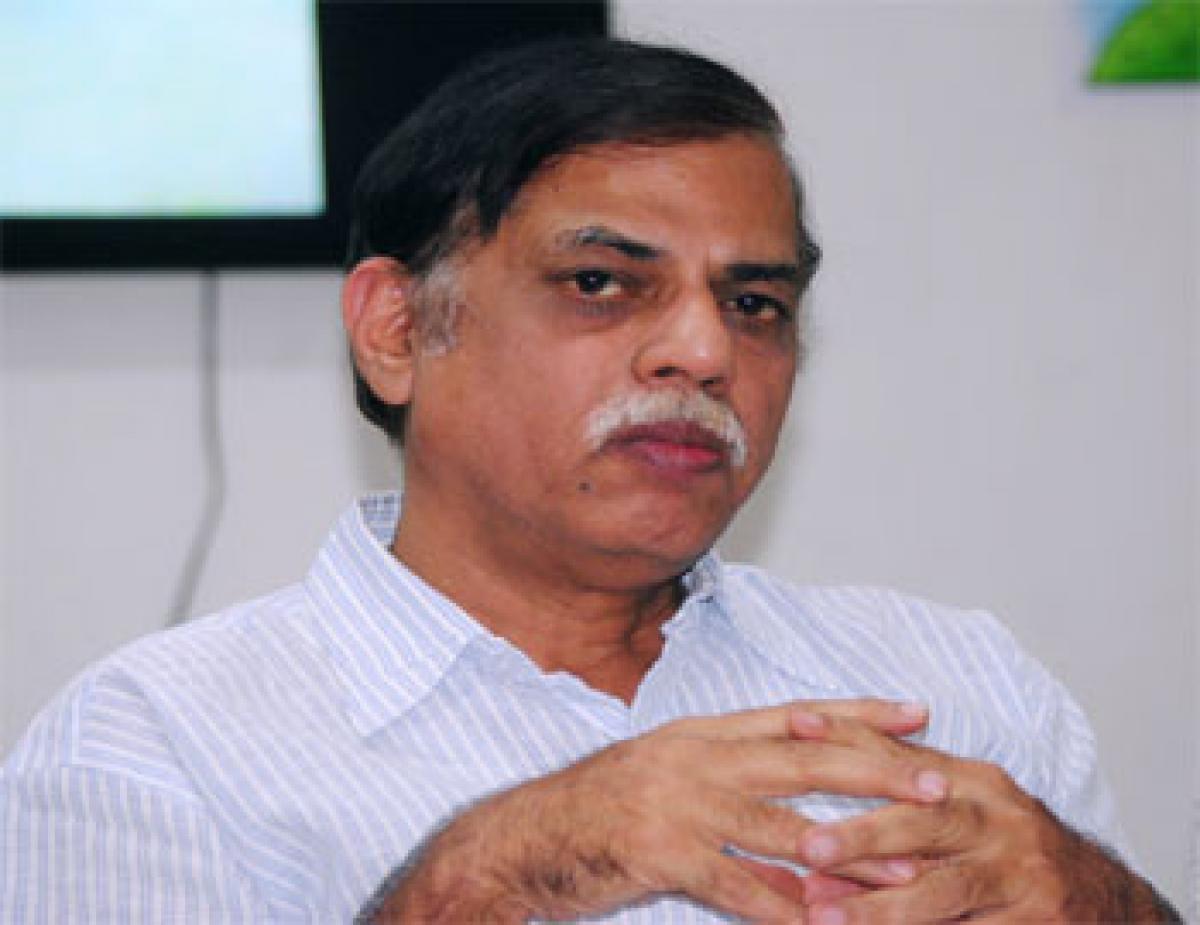How ill is mentally ill?

Mental health refers to the state of well-being or the absence of a psychological disorder. Psychiatrist Dr K Chandrashekar, MD, Asha Hospital, Hyderabad, defines mental health as “the ability of an individual to cope with stressors in life, maintain harmonious relationships and sustain employment.”

World Mental Health Day is observed on October 10 every year. The theme for 2015 is ‘Dignity in Mental Health.’ Despite its importance, the mental health of a person is one of the least discussed topics, and yet is one that begs our attention.
Simple problems like a persistent knot in the stomach, a constant urge to vent out one’s anger or just plain depression can be managed with the help of counsellors or may reach the point of no return and fit the criteria for a psychological disorder.
If acknowledging the problem is one issue; are we willing to seek help at all, is a more pertinent concern
For to be free, is not merely to cast off one’s chains, but to live in a way that respects and enhances the freedom of others.” – Nelson Mandela
Mental health refers to the state of well-being or the absence of a psychological disorder. Psychiatrist Dr K Chandrashekar, MD, Asha Hospital, Hyderabad, defines mental health as “the ability of an individual to cope with stressors in life, maintain harmonious relationships and sustain employment.”
Mental illness is just the opposite - it can be said to be a continuum ranging in intensity. Picture a person anxious while on a date or fainting at the sight of blood.
We wouldn’t normally think they possibly have a mental dysfunction. However, they might. According to ‘Abnormal Psychology – an integrative approach’, a psychological disorder is 1) a psychological dysfunction, 2) a distress or impairment in functioning and 3) a response that is not typically or culturally expected.
Mental illness, although varied, is one of the leading causes for disability, world-over. A dysfunction of this kind may thus be as subtle as a lingering fear during an activity that should otherwise be a fun experience.
 All of us struggle with hitches like a persistent knot in the stomach, a constant urge to vent out one’s anger or just a definite dislike for Math.
All of us struggle with hitches like a persistent knot in the stomach, a constant urge to vent out one’s anger or just a definite dislike for Math.
Most of us find ways to get by without allowing these difficulties to disrupt our normal functioning. An effective way to identify whether one might be suffering with general anxiety or a more serious Agoraphobia or panic disorder, is to classify one’s thoughts,
feelings, behaviours and physiological sensations as a result of any specific incident. If the symptoms are justified, he/she may just be having difficulty in managing situations.
Mental health professionals such as counsellors are trained to help with such hurdles. Help from a psychiatrist is necessary specially when these simple-looking troubles reach the point of no return and fit the criteria for a psychological disorder.
But the crucial question is if we are willing to seek help at all. There exists a stigma in our society associated with anything termed “mental.” For this reason, we are careful in using the term,
for if we do, it is not uncommon to be met with gasps and mockery. Professionals in the field say that to be fair, this reaction is warranted, for a majority of the populace has yet to understand what mental health and disorders constitute.
Causes for mental illness are often biopsychosocial in nature involving a combination of genetic predispositions, nervous disturbances and psychological factors that contribute to changes in the chemicals within the nervous system.
The cries of mental health professionals are that, irrespective of whether in rural or urban areas, persons with mental illnesses are not regarded or treated with the same dignity as patients with cardiac problems or any other illness.
Depression is yet another pertinent, yet mostly ignored mental condition that can lead to serious consequences. In fact, depression itself can exist along with other conditions or ailments (co-morbid disorder). Following a recent disclosure by a popular film actress about her personal struggles with depression,
many have taken a bold step to come out with their problems. A 2012 World Health Organisation report states that on an average, about 1 in 20 people reported having an episode of depression in 2011.
Further, little awareness exists about the spectrum of conditions under the bracket of childhood issues, which are generally equated with mental retardation. Specific issues of children include Autism,
Hyperactivity as well as several Specific Learning Disabilities like Dyslexia. Dr Purnima Nagaraja, child psychologist, Dhrithi Psychiatric Care says, “A lot of behavioural issues in children – including anger, bed wetting and phobias are often an external manifestation of something they are unable to express about.
We need to take time to understand their problems.” At the other end of the age spectrum are the elderly, whose mental health issues are also the least addressed.
Studies have revealed that very few attribute dementia-like symptoms to a possible on-going disease process that requires care. Dr Suvarna Alladi, neurologist, Nizam’s Institute of Medical Sciences says that Alzheimer’s causes disorder in patients as well as caregivers.
Depression and forgetfulness of everyday things, she says, are among the tell-tale signs of Alzheimer’s. Dr Suvarna Alladi adds, “There are several studies being done in Hyderabad, like on Mild Cognitive Impairment, a condition that precedes the diagnosis of dementia. Awareness and treatment procedures are growing.”
 One wonders if mental health care facilities in India are adequate to tend to the one per cent of population, who, studies suggest are suffering with psychosis (a severe mental disorder in which thought and emotions are so impaired that contact is lost with external reality).
One wonders if mental health care facilities in India are adequate to tend to the one per cent of population, who, studies suggest are suffering with psychosis (a severe mental disorder in which thought and emotions are so impaired that contact is lost with external reality).
Who is attending to this one per cent and more? Dr K Chandrashekar’s studies note, for a population of over 1.2 billion, our country has 6,000 psychiatrists and 1,500 professional psychologists.
The state of affairs of mental health care facilities is abysmal. While there are 41 large mental hospitals in the country, only 25,000 beds are available for wards.
This comes down to a shocking figure of 0.5 beds for every 10,000 people. Compare this with figures from the United States, and we find much disparity, where 50 beds are available for the same size of population. Further, the staff to patient ratio is also low, which is a contributing factor to unhygienic conditions and overcrowding in State institutions.
The deficit of mental health professionals in India is worrisome, even as there are fewer seats available in colleges for studies in the field. “In India, very few opt to study mental health.
Medicine and engineering are considered as reputable professions. Even among those who study MBBS, very few specialise in psychiatry. This stigma with regard to choice of professions too, should be erased,” claims Dr K Chandrashekar.
This year’s focus on ‘dignity’ primarily recognises human rights, which are often deprived of those with mental health conditions. It seeks to expose the discrimination, stigma and emotional abuse outside in the society and within mental health facilities, apart from aiming to inspect the quality of care in the same facilities.
As psychiatrist and professor of international mental health, Dr Vikram Patel mentions in his TED Global talk titled, ‘Mental health for all by involving all,’ task shifting seems to be the need of the hour. Dr Vikram Patel said, “The idea is, when you are short of specialised healthcare professionals, use whoever is available in the community.
Train them to provide a range of health care interventions. We need to deliver healthcare using whoever is available and affordable in our local communities.”
This ‘World Mental Health Day’, we once again echo the universal call to action in specific ways that might help – a call for the society, the government, NGOs, families, and educational institutions.
A call to explore what dignity might mean to all those associated in various ways with mental health issues. Whether it means to listen to their cries, help them study and find a job or simply guide them to therapy.
Basic questions to help identify a mental illness:
1.What changes have you noticed recently in terms of behaviour, emotions, speech or attire?
2.Do these changes fit the following criteria: dysfunctional, impaired functioning, atypical and culturally inappropriate?
By:Elita Enoch








